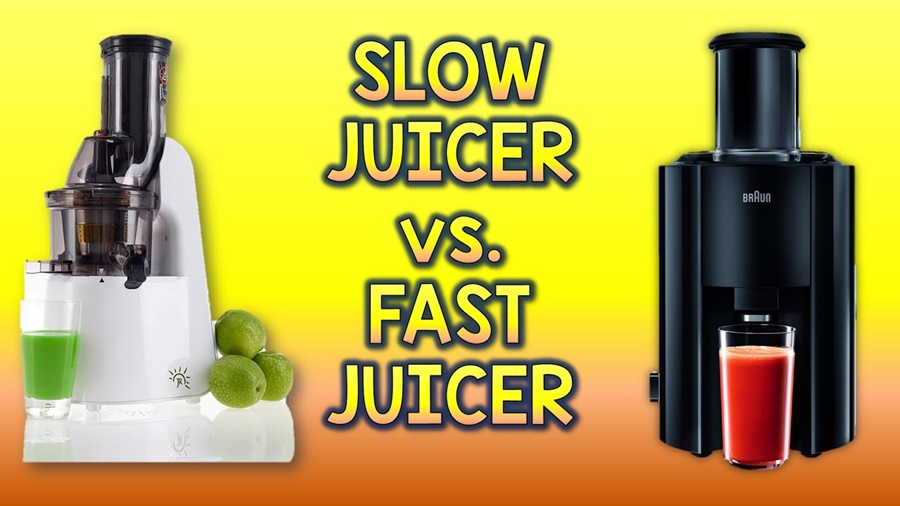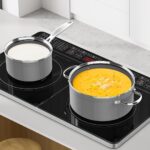When it comes to choosing the best juicer for your health and lifestyle, understanding the key differences between slow juicers vs fast juicers is essential. Both types serve the same basic purpose—extracting juice from fruits and vegetables—but they operate differently and offer distinct advantages and disadvantages. In this comprehensive guide, we’ll explore every detail to help you make the best-informed decision.
What Is a Slow Juicer? (Masticating Juicer Explained)
A slow juicer, also known as a masticating juicer, operates using a slow rotating auger to crush and press produce. This method extracts juice slowly and methodically, typically at 40 to 100 RPM (rotations per minute), which results in higher juice yield and preserved nutrients.
Key Features of a Slow Juicer:
- Low-speed motor reduces heat build-up and oxidation.
- Better for leafy greens, wheatgrass, and fibrous vegetables.
- Minimal foam and separation in the juice.
- Longer juice shelf life—up to 72 hours when refrigerated.
Advantages of a Slow Juicer:
- Higher nutritional value due to minimal heat and oxidation.
- Quieter operation compared to centrifugal models.
- More juice from the same amount of produce, saving money over time.
- Better for making nut milk, sorbets, and baby food.
Disadvantages of a Slow Juicer:
- Slower juicing process, typically taking several minutes.
- Higher price point, especially for premium models.
- Smaller feeding chute requires more chopping of produce.
What Is a Fast Juicer? (Centrifugal Juicer Explained)
A fast juicer, or centrifugal juicer, uses high-speed spinning blades (usually 6,000–14,000 RPM) to shred fruits and vegetables while a mesh filter separates the juice from the pulp. It’s a more traditional option commonly found in household kitchens.
Key Features of a Fast Juicer:
- Rapid operation, juicing most produce in under a minute.
- Wide feeding chute minimizes prep time.
- Best suited for hard fruits and vegetables like apples, carrots, and celery.
Advantages of a Fast Juicer:
- Speed—ideal for busy mornings or quick routines.
- Lower upfront cost, making it more budget-friendly.
- Easy to find replacement parts due to its popularity.
Disadvantages of a Fast Juicer:
- Lower juice yield, especially with leafy greens.
- Oxidation and heat build-up can reduce nutritional value.
- Shorter juice shelf life—best consumed immediately.
- Noisier operation compared to masticating models.
Nutritional Comparison: Slow Juicer vs Fast Juicer
One of the most important factors for health-conscious consumers is nutrient retention. The slow juicer clearly outperforms the fast juicer in this category.
Why Slow Juicers Preserve More Nutrients:
- Lower RPM minimizes oxidation and heat, protecting enzymes and vitamins like Vitamin C, A, and E.
- Gentle squeezing action keeps minerals and phytonutrients intact.
- Juice retains its color, taste, and antioxidant properties longer.
In contrast, the fast juicer’s high-speed blade generates heat and introduces air, which breaks down sensitive nutrients, leading to foam, separation, and faster spoilage.
Juice Yield & Efficiency: Getting the Most Out of Your Produce
When considering long-term use, efficiency is crucial. Slow juicers extract up to 30% more juice compared to centrifugal models. Over time, this adds up to significant savings on produce costs.
- For example, juicing 1 pound of spinach may yield:
- Slow juicer: 8 oz juice
- Fast juicer: 5–6 oz juice
- The drier pulp from a slow juicer indicates better extraction.
If you juice frequently, the return on investment from reduced waste is substantial.
Ease of Use & Cleaning Time
Fast Juicer Pros:
- Quick assembly and juicing.
- Larger feed chute means less chopping.
Slow Juicer Pros:
- Easier to clean, with fewer sharp blades.
- No splatter or clogging when using fibrous vegetables.
Fast juicers may save time upfront, but their multi-part mesh filters and blades can be harder to clean, especially with sticky produce. Many slow juicers offer self-cleaning functions, making daily juicing more practical.
Noise Levels: Quiet vs Loud Operation
If you’re juicing early in the morning or in a shared living space, noise becomes a factor.
- Slow juicers: Operate at a quiet hum—ideal for early risers.
- Fast juicers: Often sound like a blender, reaching up to 90 decibels.
Versatility: More Than Just Juicing
Slow juicers are more versatile in their capabilities. Many come with attachments or functions for:
- Nut butters
- Frozen fruit sorbets
- Pasta extrusion
- Nut milks
- Baby food preparation
Fast juicers, by contrast, are limited to juicing and often struggle with softer or leafy ingredients.
Shelf Life of Juice: How Long Will It Last?
The juice produced by a slow juicer can last up to 72 hours when stored in an airtight container in the fridge. This is thanks to its low oxidation process. On the other hand, juice from a fast juicer begins to deteriorate within 20 minutes, as air and heat accelerate the spoilage.
Cost Comparison: Short-Term vs Long-Term Investment
Fast Juicer Cost:
- Entry-level models: $50–$150
- Shorter warranty period (1–2 years)
- Lower upfront investment but higher long-term produce cost
Slow Juicer Cost:
- Mid to high-end models: $200–$600+
- Often comes with a longer warranty (up to 10 years)
- More expensive upfront but saves on produce over time
Which Juicer is Better for Your Needs?
Choose a Slow Juicer if you:
- Prioritize nutrition and juice quality
- Juice leafy greens and soft fruits regularly
- Want less waste and more yield
- Prefer quiet operation
- Juice in bulk and store juice for days
Choose a Fast Juicer if you:
- Need speed and convenience
- Mostly juice hard fruits and veggies
- Are on a budget
- Don’t mind consuming juice immediately
- Juice occasionally rather than daily
Conclusion
If you’re serious about nutrition, yield, and long-term savings, a slow juicer is clearly superior. While fast juicers have their place for quick, occasional use, they simply cannot match the juice quality, versatility, and efficiency of their masticating counterparts.








Leave a Reply